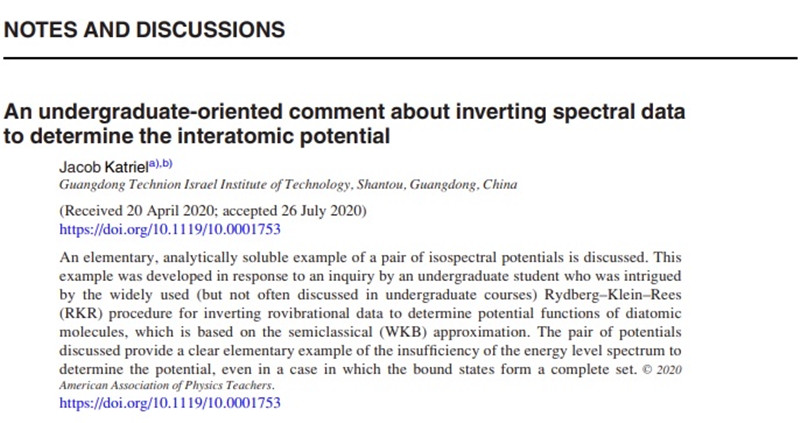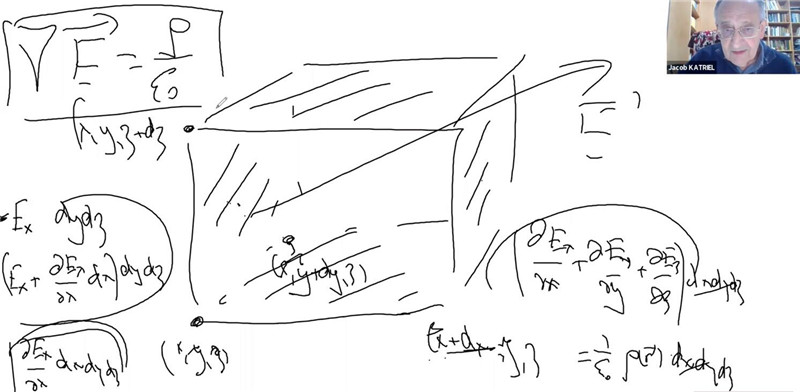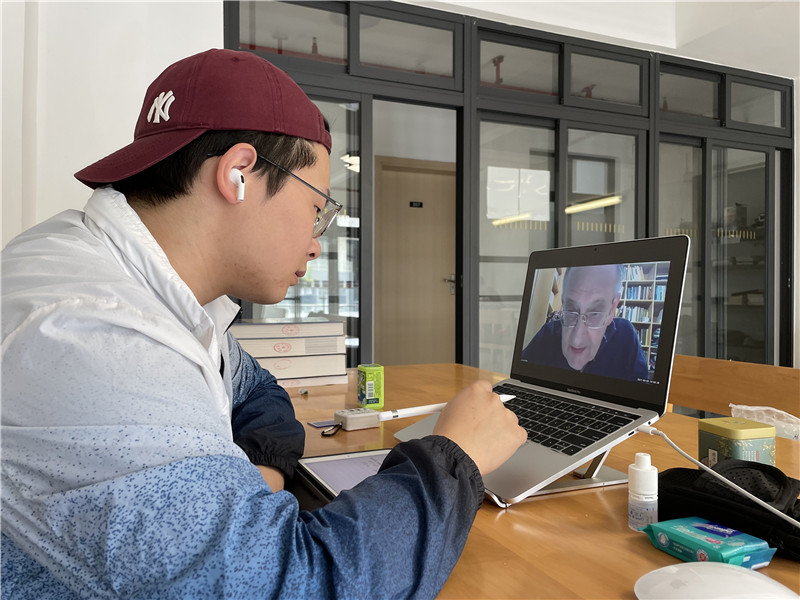PostTime:5/9/2021
Based on a question raised by an undergraduate student, Prof. Jacob Katriel published an article titled An Undergraduate-oriented Comment about Inverting Spectral Data to Determine the Interatomic Potential in the American Journal of Physics, discussing an elementary, analytically soluble example of a pair of isospectral potentials, which illustrates the insufficiency of the energy level spectrum to determine the potential, even in a case in which the bound states form a complete set.

"Prof. Jacob, could you provide some information about the RKR process mentioned on page 216 of the textbook?" Jacob was excited when he received an email from Yao Zhixiang, a student from Materials Science and Engineering program. To Yao Zhixiang's surprise, Jacob not only answered his question immediately, but also wrote a paper to share his understanding of RKR applications with other people who teach similar subjects and encourage students to develop inquisitive minds in the process of learning. "Yao Zhixiang was intellectually curious about a problem that the textbook mentioned briefly. This intellectual curiosity is what we aim to cultivate and encourage, because it is the key to initiative and innovation in science and technology." Due to Covid-19, Jacob switched to teach the Molecular Spectroscopy course online from Israel when the 2020 Spring Semester started. "It's a radical transformation for all of us." To help students understand the course, Jacob provided a Q&A session. "The students were offered a closed website where they could find reading materials, references to appropriate chapters in their course textbook, along with a detailed learning guide accompanying each chapter. They were promised credit for 'good' questions," said Jacob. In his opinion, the role of the professor should have transformed from a knowledge provider to guide in an adventurous intellectual pursuit. "For nearly fifty years, I started each of my courses preaching about the benefits of self-study ahead of class. For the majority of my students, these sermons remained futile." However, a steady flow of enquiries from GTIIT students came to his email, providing him with feedback that the seeds he had planted were slowly blossoming. Jacob made an effort to respond promptly despite the 6-hour difference between Israel and China. "I sent the email at 00:21(Beijing Time) and managed to receive Jacob’s reply 2 hours later," said Yao Zhixiang. He added that "I was interested in the application of RKR while reading materials but I failed to find more valuable information from the internet so I asked Jacob for help." Jacob offered supporting reading materials which provided a basic introduction to the WKB (semiclassical) approximation to help the student better understand the problem. "In a particularly simple context, vibrational energy levels are not sufficient to determine the potential." Yao Zhixiang's question made Jacob think more carefully about the problem he asked about. "I realized that this topic was not covered very well in the undergraduate textbooks although it can be introduced in a simple way," said Jacob. Five days after the student asking the question, Jacob wrote a teaching paper according to the topic and sent it to Yao Zhixiang. At the end of the article, the role of Yao Zhixiang was also acknowledged, "the author wishes to thank Mr. Yao Zhixiang, for his curiosity, which inspired the present paper". Inspired by Jacob, Zhixiang Yao, together with his classmate Zhang Wentao tried to help their classmates in Quantum Chemistry when the new semester began. Promoting each other through the teaching-learning process is an ideal of education and also what GTIIT faculty team are in pursuit of. GTIIT will continue to adopt problem-driven teaching, derived from the Technion to cultivate the innovation of sci-tech talent for the good of humanity. Text/Photos: GTIIT News & Public Affairs

© GUANGDONG TECHNION-ISRAEL INSTITUTE OF TECHNOLOGY | 粤ICP备17036470号
